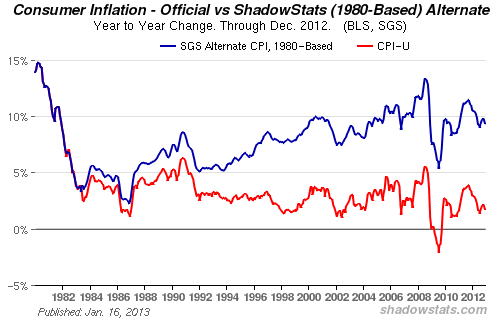We’re In a Global Currency War … But What Does It Mean?
There is a currency war raging world-wide.Japan, Brazil, Peru and countries all over the world are trying to beggar thy neighbor (just as happened during the 1930s) and gain a leg up for their exports by cheapening their currencies.
As the Wall Street Journal writes:
Beggar-thy-neighbor currency devaluations proved ruinous for the global economy in the 1930s. Is the world setting off down the same slippery slope again?
Japan’s decision to intervene in the currency market to drive down the value of the yen blew a hole in the developed world’s united effort to persuade China and other Asian countries to stop artificially holding down their currencies.
If you take a step back, it really is an odd situation. As Joe Weisenthal notes:
Just think for a moment about the screwy times we live in when central banks are trying to hurt their rivals by buying up their rivals’ bonds — essentially lending them money.
Such is the state of things in a world where every country wants to weaken their currencies to boost their own exporters.
And the House has passed legislation saying China is a currency manipulator and has to raise the value of the Yuan.
What does it mean?
American experts say that the Chinese Yuan is undervalued by 25%, which makes Chinese exports artificially competitive. The U.S. Congress is trying to blame China’s undervalued currency for America’s bad economy and unemployment woes.
But the former U.S. trade representative, Susan Schwab, says that – while there’s a very real problem in terms of China artificially keeping the renminbi low – this isn’t the way to solve anything. Schwab calls it “a signal-sending exercise during an election season”. She says that the bill won’t really do anything, even if the Senate passes it and it is signed into law. Schwab says it “makes no sense”, won’t solve any problems, will escalate tensions, and will only divert attention from the real trade problems between the U.S. and China.
Indeed, Schwab warns that other countries might decide that this U.S. bill means that its open season for addressing currency manipulation, and that other countries believe that the U.S. is manipulating our currency. She says there could be a “boomerang effect” from the legislation….
Russia is warning that we are rapidly approaching a global “currency war”
Billionaires such as George Soros and John Paulson have been hoarding massive amounts of gold
Billionaires buying up so much ranch land up in Montana
Germany announced that it will be moving gold from New York and Paris to its own vaults back home? Is this a sign of a breakdown in trust among global central banks?
The U.S. Mint is on pace to sell more silver eagles during the first month of 2013 than it did during the entire year of 2007
The Japanese Yen Trade Is Exporting Inflation to China
WORLD DOLLAR PANIC IMMINENT? Masses Close To Realizing Their Money Is Being Destroyed
Today 40-year veteran, Robert Fitzwilson, wrote the following piece exclusively for King World News. Fitzwilson, who is founder of The Portola Group, warns, “When the masses realize that their money is being overtly destroyed in front of their eyes, there will be a panic. By then, it will be too late.” Below is Fitzwilson’s piece which discusses the approaching end game, and how gold and silver will be the primary beneficiaries.Below is Fitzwilson’s exclusive piece for KWN:
“Over the millennia, gold and silver have been the critical intermediaries between purchasers and providers of goods and services. Having a sound standard for economic activity has been a critical factor in the rise of history’s most influential societies. In our time, nothing seems to generate more heated discourse than the topic of a gold standard…
China sovereign wealth fund may cut US debt holdings
China’s sovereign wealth fund, which has more than US$480 billion in assets, could cut holdings of US Treasury Bonds as they are becoming a less attractive investment, In line with the future US economic recovery, the appeal of US debt is weakening,” Lou said. “From a long-term p…Currency Wars Are Bullish For Precious Metals Investors
As nations see Japan’s success in weakening the yen (see discussion), some begin to take notice. Emerging markets nations often attempted to devalue their currencies in the past in order to improve competitiveness. But these days developed economies are doing it as well. This morning the Russians called these policies “currency wars”, which is a good way to describe the latest developments. And such policies are not limited to Japan.Bloomberg: – The alert from the country that chairs the Group of 20 came as Luxembourg Prime Minister Jean-Claude Juncker complained of a “dangerously high” euro and officials in Norway and Sweden expressed exchange-rate concern.
The push for weaker currencies is being driven by a need to find new sources of economic growth as monetary and fiscal policies run out of room. The risk is as each country tries to boost exports, it hurts the competitiveness of other economies and provokes retaliation.
Yesterday “will go down as the first day European policy makers fired a shot in the 2013 currency war,” said Chris Turner, head of foreign-exchange strategy at ING Groep NV in London….

